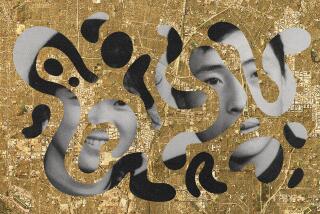‘Rising Sun,’ Hollywood and Asian Stereotypes
- Share via
When it comes to its portrayals of Asians and Asian-Americans, Hollywood still doesn’t get it. Already this year we’ve had the film “Falling Down,” which was criticized for its portrayal of a Korean-American grocer. Now we have “Rising Sun” coming this summer from 20th Century Fox.
“Rising Sun,” based on the novel by Michael Crichton, is the story of two Los Angeles police detectives investigating the murder of a white woman in a building owned by a Japanese corporation. Both the novel and the script of “Rising Sun” exaggerate the influence of Japanese corporations over American institutions such as the LAPD, the U.S. Senate and even the Los Angeles Times.
In recent years, the media created a paranoid image of a Japanese “takeover” of the United States even when the United Kingdom and the Netherlands have similarly large investments in our country. In many instances, this has fostered resentment against Americans of Asian descent since many people cannot tell the difference between Asian ethnic groups or between Asians and Asian-Americans.
For instance, Vincent Chin, a Chinese-American, was murdered in 1982 because his assailants thought he was Japanese. During the recent media overkill of the 50th anniversary of the bombing of Pearl Harbor, there was a documented increase in hate crimes against people of Asian decent.
*
Our organization, the Media Action Network for Asian-Americans (MANAA), is not defending Japanese business or government practices. We are concerned that “Rising Sun” might foster further anti-Asian sentiment.
We would like to clarify some of the points made in the article “Group Takes ‘Rising Sun’ Protest Public” (Calendar, April 7). We would have preferred to have seen the finished film before the release date, but Fox denied our requests and canceled meetings for three months, so we felt we had no choice but to make our concerns public following eight months of behind-the-scenes negotiations.
We are basing our concerns on a copy of the shooting script. Sources close to the film kept us informed of changes made during filming.
In the Calendar article, Strauss Zelnick, president of Fox, is quoted as suggesting that MANAA is somehow attempting to censor the film in violation of “the freedom of expression guaranteed by our Constitution.”
MANAA believes strongly in the First Amendment and the freedom of expression. Furthermore, we have made no attempts to “censor,” nor are we calling for a boycott of the film. In fact, we are exercising our First Amendment rights by voicing our concerns. We were merely trying to sensitize the filmmakers to the one-sidedness of “Sun” with the hope that a more responsible film would be made.
MANAA requested that Fox place a statement at the start of the film emphasizing that the movie is a work of fiction not meant to imply that all Japanese people are trying to take over America, and to take a stand against the growing problem of hate crimes against Asian-Americans. Similar statements have appeared in films like “The Year of the Dragon” and “Scarface.”
*
Zelnick refused this request saying that such a statement “may damage the film’s commercial potential.” We fail to understand how a short statement could do that. Is Fox suggesting that making money is more important than taking a stand against anti-Asian racism and violence? We also suggested that Fox use consultants sensitive to the Asian Pacific American community in future projects. That request was also denied.
The media plays an important role in shaping the way America looks at certain groups, including Asian-Americans. Hollywood, in particular, continues to portray Asians and Asian-Americans in one-dimensional, dehumanizing ways. Asian males are usually nerds, rude foreigners or gangsters. Asian women are exotic playthings for white males, geishas or subservient girlfriends. Just look at films like “Sixteen Candles,” “Year of the Dragon” or “Tai Pan.” They all contribute to further misunderstandings of who we are as regular people.
MANAA was formed to advocate more accurate and balanced media portrayals of persons of Asian Pacific ancestry. The Calendar article stated that our membership comprises “100 business people,” but we have members from all walks of life, including journalists, lawyers, community activists and students.
MANNA is here to declare that Asian Pacific Americans will no longer accept the stereotypes, the misrepresentations or the racism perpetuated by Hollywood and the media. We will continue educating the public to “Rising Sun” until its release. If the finished product is as bad as we fear, expect nationwide protests similar to those launched almost 10 years ago against the film “The Year of the Dragon.” We will be silent no longer.
More to Read
Only good movies
Get the Indie Focus newsletter, Mark Olsen's weekly guide to the world of cinema.
You may occasionally receive promotional content from the Los Angeles Times.










